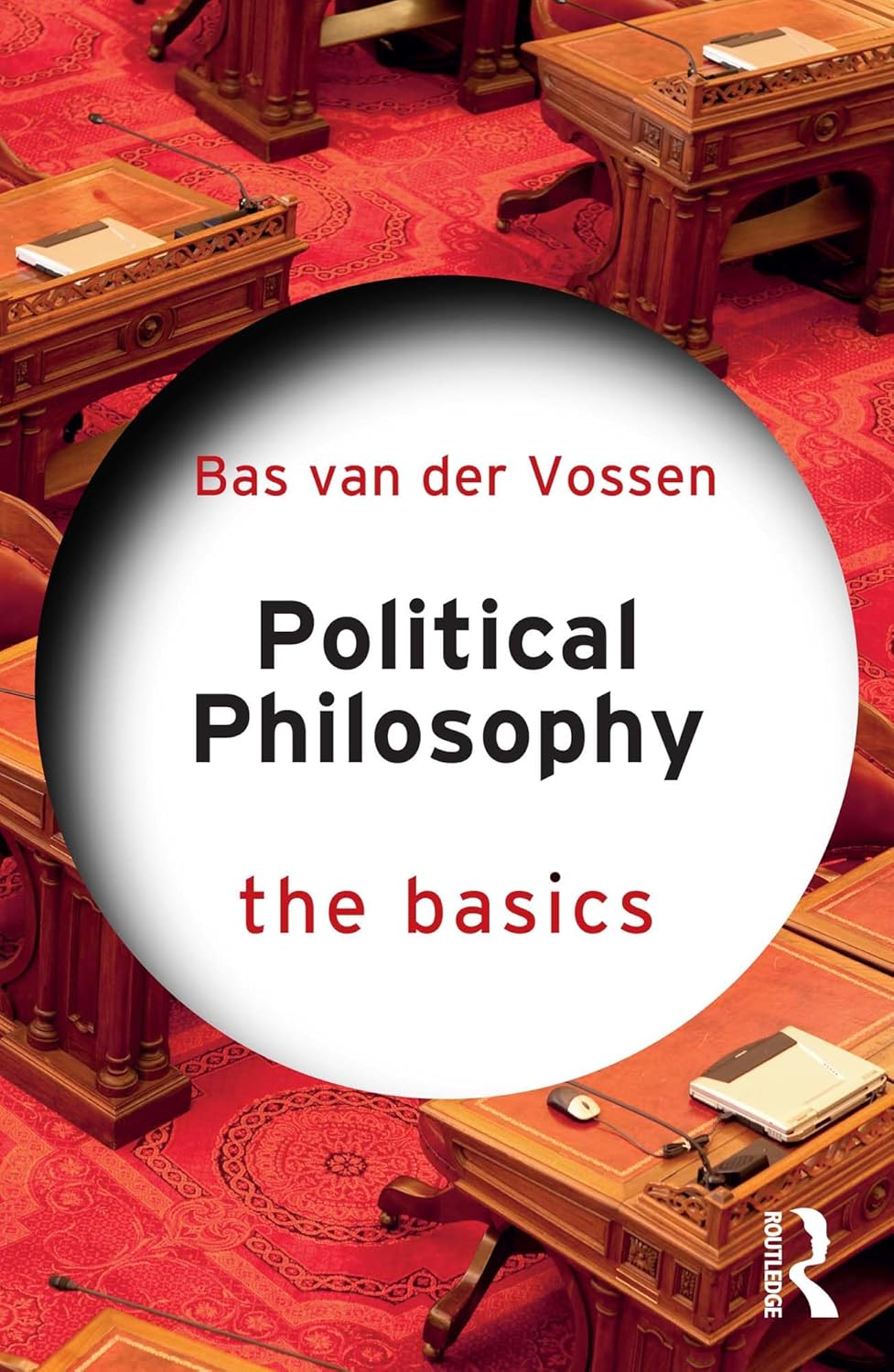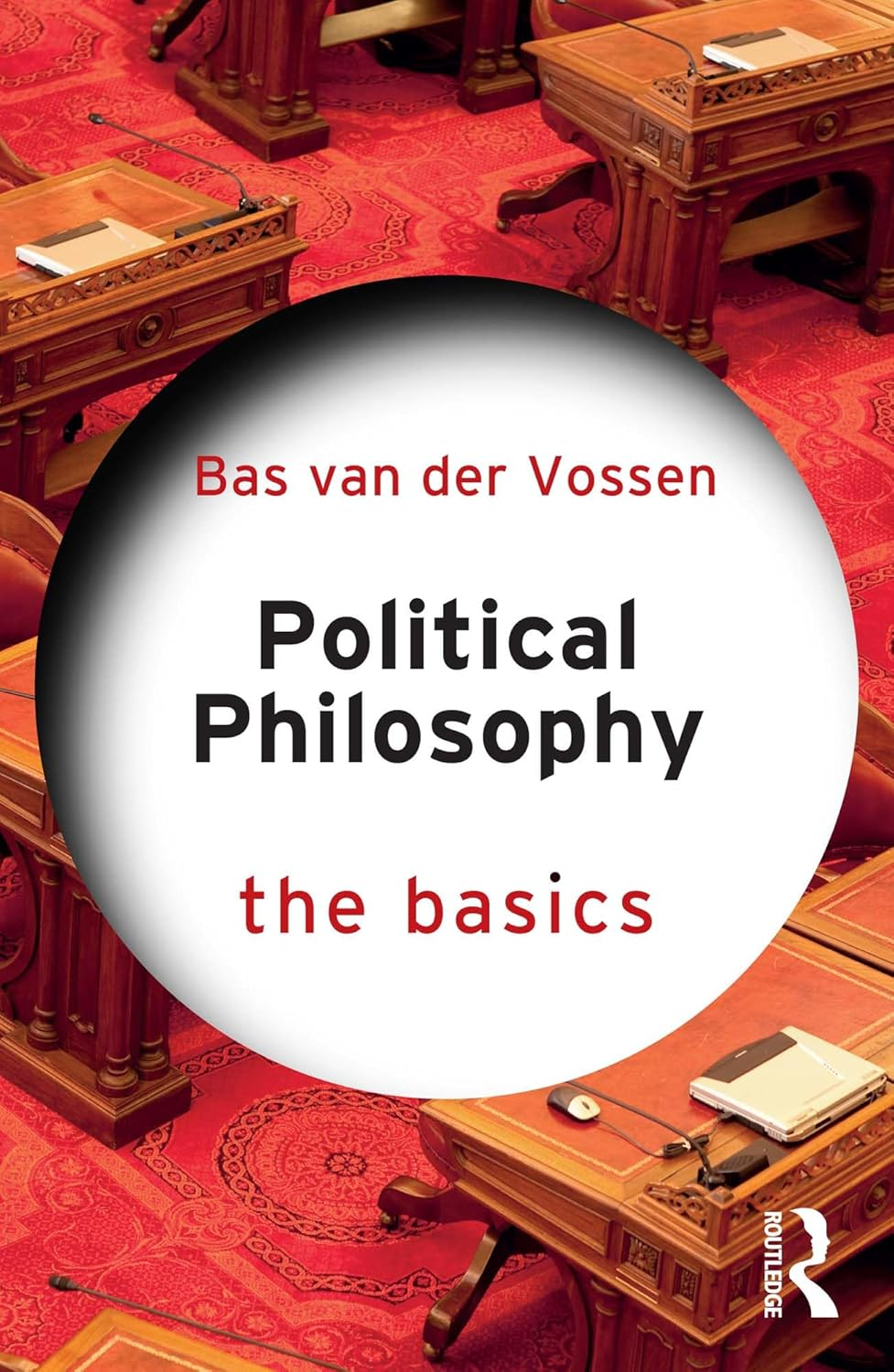Bas van der Vossen, Political Philosophy: The Basics


Bas van der Vossen, Political Philosophy: The Basics (Routledge, 2025)
The story of Socrates’ death has been famous for millenia. The denouement is that the Greek sage could have escaped the punishment planned for him for his alleged corruption of the youth of his community, but he declined to run because he thought the right thing to do was to submit to his death penalty. Van der Vossen’s book considers this matter at some length, eventually (and tentatively) concluding that maybe Socrates wasn’t really obligated to drink the hemlock prescribed by his government for his sins.
Socrates may seem to have landed himself in a very unusual dilemma. But consider what may be a more familiar situation. Suppose you are starting at a new school. You’re 12 years old, so you don’t know the entire story of why or how you were signed up for this place, but you assume that your parents had something to do with it. You’ve been going to one school or another since you were about five, so you have some idea what to expect, but have heard that you will have to wear a uniform at this new place, and that if you talk in class without being called upon, you will be sent to detention. Maybe, like Socrates’ friend Crito, you wonder whether escape might be possible. But it’s likely you aren’t going to make a moral problem out of the school’s power over you. Instead, you will focus on estimates of prudential value. That means that, for you, the main (though perhaps not only!--see below) question may be “What will be best for you (and if you’re a decent sort, some of your family and friends as well). Presumably, you will calculate that if you try to sneak away, say during lunch, either you will get caught and punished (bad for you), or you will somehow manage to avoid capture but won’t know where your next meal or bed is to come from (bad for both you and your parents). So it’s unsurprising that you–and most kids in such circumstances–will suck it up and do what you’re told….with maybe the occasional backslide.
Nothing in the school scenario seems terribly controversial or philosophically interesting. But Socrates and many of the political philosophers since his time have made a good deal more of these sorts of predicaments; they don’t merely want to know what is best for us–or our societies–even when considered over long periods of time. They want to know what’s right. Is the school (or government) really “authorized” to control us the way it does? Are its rules “legitimate”? In other words, they believe it’s important to consider the moral implications of these sorts of predicaments. “Sure,” they ask, “you might be able to get away with this or that move…but should you? Would they be the right thing to do?”
That is why most political philosophers, and Van der Vossen is clearly in their number, feel the need for some sort of grand theory of “legitimacy.” And if they can’t find an appealing one whose criteria are met by the polity in which they live, they aren’t just stymied, but unhappy: sometimes inferring that we may have the moral obligation to defy these governments whenever they require us to do something that seems to us to be contrary to ethical principles.
As it turns out, Van der Vossen is uncomfortable with several of the usual ways of handling this predicament. He doesn’t buy Socrates’ decision to poison himself simply because the rulers of his homeland, a place where his residence has allowed him to reap various benefits, have told him (but for bad reasons!) that he must do so. But our author is also unconvinced by several of the rationales that have traditionally been provided for escape routes according to which Socrates may be generally required to do what his government says, but can weasel out of this particular edict, perhaps because the powers that be happened to get something wrong this time.
With this as its main focus, Political Philosophy: The Basics is a (mostly) clear, well-argued little book, and one that is sure to give both students and lay readers a good sense of how philosophy is conducted and what political theory is about. But I do think it suffers from the fact that while van der Vossen is puzzled by what is necessary to produce defensible political obligations, he is entirely comfortable with the view that his durable moral intuitions are generally trustworthy. I would argue in fact that it is his confidence in the latter that produces his passion for finding a master key to the former. For example, he is quite sure that we know that killing and stealing are wrong and that this means that we shouldn’t kill or steal whether or not there are laws against such activities. Similarly, he tells us that we all already know or can learn quite quickly that private property rights need to be protected and contractual terms obeyed–not because laws say so, but whether or not they do so. Indeed, he even tells us quite confidently that eating cows is wrong, and that supposing homosexuality to be “deviant” is “silly.”*
It is true that knowing those sorts of things would allow us to be certain how to view any relevant laws, e.g.,whether they (a) prohibit homosexuality or meat-eating, (b) say that those activities are perfectly fine, or (c) find ways to encourage them. Unfortunately, however, if one applies the same sort of focus on morality as van der Vossen does on the specific matter of political obligation, one can be expected to end up with the same sort of uncertainties. There are many trolley stories that ought to convince us of that fact.
Thus, while his whittling the various views of Socrates, Aristotle, Hobbes, Locke, Rousseau, and others into clear, well-constructed arguments seems to me to be expertly handled, I find the entire book to be a bit off-kilter for not explicitly recognizing the author’s own axioms. As van der Vossen puts it, “thinkers like Hobbes and Rousseau strongly believe that life in society is vastly preferable to life in a state of nature, but…the question [is] whether people can be rightfully forced to accept the rules of society” [his emphasis]. I myself doubt that Hobbes was making a moral rather than prudential case for his Leviathan. But I don’t claim that van der Vossen is alone in putting ethics not just at the head of the political philosophy table, but making it the only invited guest. For it isn’t just Rawlsian “liberals” but also libertarians–both of the bleeding heart and uncaring anarchist species–that generally forge their ways forward by reliance on their moral intuitions. That is surely the most common way of proceeding in what I take to be the at-least-as-confused-as-it-is confusing world of political philosophy.
To be fair, if there are such things as moral truths (and I’m not claiming that there aren’t!), it has been famously argued by John Searle, that we can derive true ones from such (non-moral) facts as promise-makings. That is, if a person P promises her friend R that she will do X for her–a purely factual matter–then, unless some weirdness intervenes, we can infer that P (morally) ought to do X. Similarly, it seems that we can derive various things that (morally) ought not to be done or that are not (morally) exceptionable from the fact of a prior consent or agreed-upon contract. Such agreements are central for many political philosophers, since “consent of the governed” has regularly been associated with governmental legitimacy. The idea is that if P consents to R’s having the power to do X to her, we can conclude that it is (morally) allowable for R to do it.
This is an important feature of the world, not only for Socrates, Hobbes, Locke, and Rousseau, but for van der Vossen and many other theorists too. The problem, however, is not just that (as Hume and others have explained) “tacit” versions of consent--say, living someplace for a long time–might not be thought to count as authentic agreement, but also that many theorists who utilize consent are reliant on their “moral sense” for ethical claims that cannot be inferred from Searlian-type derivations. For example, many philosophers and political scientists are quick to deny that slavery can ever be morally appropriate–whether it has been agreed to by all participants or not. And van der Vossen is in this group: he simply knows that freedom and other such “human rights” can never be appropriately violated, consent or no consent. Thus, even if there were no questions regarding whether the relevant agreements were made unanimously or explicitly, there doesn’t seem much hope for any theory of political obligation based purely on consent.
For what it may be worth, my own take is that if we are more modest about the “heavyweight” matter of “real government authority,” and admit that we may not ever know with complete confidence what is ethically right, we may come to recognize our similarities to the above discussed 12-year-old schoolboy. That is, we may begin to rely instead on (the more humble) prudential values that are available to answer the question of why we “ought” to obey governmental edicts (where the “ought” is not taken as a moral term).**
What if we ignore my concerns about van der Vossen’s traditional focus on morality here? Is his book a valuable introduction to the field? On the plus side, I believe it will give students a good idea of how philosophy should operate: they will learn that headway may be made only through the clarification of concepts, the construction of arguments, the consideration of examples and counter-examples, and the search for and elimination of fallacies. In addition, the views of a number of historically important political theorists are summarized quite nicely. It is particularly good, I think, on its explications of both positive/negative freedom and process- and outcome-equality.
Students who get through the book (and it’s a pretty quick read) could be expected to emerge with a basic understanding of what political philosophy is all about. On the downside, it’s a bit repetitive for such a short work, occasionally bouncing back to topics that seemed to have been dispensed with in earlier chapters. Elimination of a few redundancies would have allowed for additional elaboration of matters like territoriality, delegation vs. trusteeship, deliberation, and the alleged benefits/deficiencies of various constitutional provisions and governmental structures.***
Additionally, the final, quite unusual, chapter of the book may disturb some prospective users–although I would expect college administrators in today’s U.S. to love it.
There, van der Vossen argues against students getting involved in political activism based on his belief that such engagement is likely to stain a good deal of ivory in the tower. On his view, since philosophers should be, first and foremost, lovers of truth, they need always to keep at least one nostril above the fray. His main argument for this stance is that activism often leads to bias because it generally involves a sort of “group think” that drains one’s objectivity. That’s hard to deny. Furthermore (Snyder’s On Tyranny notwithstanding), the usefulness of protest is often doubtful. Nevertheless, in what seems to me a rather odd turn given van der Vossen’s supreme confidence in his moral intuitions, activism is discouraged based on the fact that “even when we think we’re pursuing good and important things, we might be mistaken.” No doubt. But even confirmed doubters need not agree that scepticism regarding such matters as state legitimacy affords a decent basis for spending one’s life reading Nozick or Marx in bed–when a friend’s or neighbor’s house is surrounded by masked ICE agents.**** Again, it may be van der Vossen’s apparent lack of interest in prudential values in favor of his exclusive focus on what is ethically correct that results in his conclusions about what we “ought not” to be doing to improve things in society even when they have clearly become horrific. This sentiment alone seems to me to be a good reason for giving up any search for the holy grail of governmental legitimacy.
In sum, I think it could be argued that in spite of this book’s undeniable virtues, several significantly older, fatter (and now more expensive) introductions to the field, like Mayo (1960) or Benn and Peters (1959), may remain preferable. Of course, if an instructor does go that route, she must forgo van der Vossen’s concise–but excellent, and I think eminently fair–discussions of Rawls on principles of justice, and Hobbes’ reliance on the Prisoners’ Dilemma; and those may be forfeitures to which no mid-21st Century professor of political philosophy can rationally consent.
_______________
*Please note that I am sympathetic with both attitudes: in fact, I have refrained from the consumption of mammals since well before van der Vossen was born. I simply don’t agree that any moral truths can be inferred from my feelings of empathy for my bovine fellows.
** Again, though, I do not deny the existence of moral truths. I discuss this matter in relation to Jane Austen’s astute Mansfield Park indictment of someone who doesn’t understand the difference between moral and prudential values here. Furthermore, it’s clear that prudential values–what is good for persons or groups–can never alone be capable of taking a questioning philosopher all the way to defensible polities or government edicts. That’s because if such values are construed as even the main support for “good government,” thoughtful observers will want to know WHY this is so. Why, that is, should amounts of individual or overall wellbeing (or, severed from any alleged taint utilitarianism, the number of successful choices) be the goal of good government, rather than, e.g., ju stice, or doing God’s will, or the production if the highest volume of resulting pleasure, or satisfying some “maximin” principle? Furthermore, if prudential values can be maximized in tyrannical states or societies having no government at all, why drag such things as democracy into our pile of desiderata? In other words, we would need to settle on one or more “intrinsic goods” and determine what (if any) sort of government is likely to maximize them, whatever might be our conclusions regarding estimates of expected overall wellbeing. And it is doubtful that settling on that matter can be achieved without utilization of at least one premise that cannot be supported by anything more fundamental. That, I suppose, is a long way of saying that you do have to start somewhere when doing philosophy. So, I recognize that the same sort of criticisms that I make above to the use of moral intuitions may also be leveled upon my reliance upon this or that alleged intrinsic good. After all, if our moral intuitions can’t be trusted, why do I think we should have any more faith in our beliefs about what seem to us to be intrinsic goods? Obviously this book review is not the appropriate venue for that argument.
***It may be that, as a long-time (or perhaps one-time?) libertarian, van der Vossen is just not terribly interested in the details of democratic procedures or the varieties of possible governmental arrangements.
****It’s fear that keeps me under my own bed. See this, this, and this for explanations.

About the Author
Walter Horn is a philosopher of politics and epistemology.
His 3:16 interview is here.
Other Hornbook of Democracy Book Reviews
His blog is here